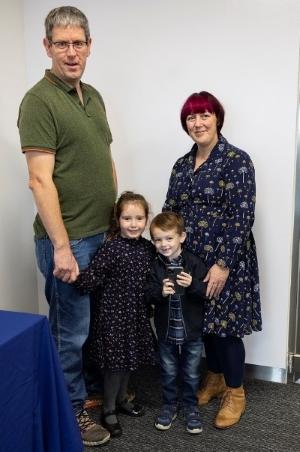Boston Scientific: When a Loved One Has Parkinson’s Disease
Published 12-13-23
Submitted by Boston Scientific

Eleanor O’Sullivan was in a shopping mall food court in 2011 when her partner of more than six years, Ivan O’Regan, took her hand and looked at her as if he had something to say. She stopped him before he could utter a word.
“Wait, we’re not doing this here,” Eleanor recalls telling Ivan in that moment. “I knew he had something big to tell me.”
Big turned out to be an understatement. When they got home, Ivan shared that he’d just been diagnosed with young-onset Parkinson’s disease. He was 31 years old. Eleanor was 32.
Now, over a decade later, Eleanor shares how Ivan’s diagnosis changed both of their lives—and how a Boston Scientific treatment helped them take a turn for the better.
Ivan’s symptoms were subtle at first. He was finding it difficult to type certain keyboard commands, like control-alt-delete. When he’d lift his hand up, he noticed it shaking a little bit.
We now know these were early signs of Parkinson’s disease. But it wasn’t until Ivan took me to the emergency room one day after I’d cut my finger that he ultimately talked to a doctor about his symptoms. The doctor recommended he come back for a brain scan.
A few weeks later, we found ourselves in that food court.
A slow progression of Parkinson’s symptoms
When we started searching to learn more about Parkinson’s, all we saw were images of older people. The advice we found didn’t speak to us at all.
We were in denial as well, thinking, This isn’t supposed to be happening. We’re just starting out in life. For the first two years, Ivan had appointments every six months. While his symptoms were manageable, we had so many questions: Can Ivan keep working? Am I going to have to look after him indefinitely? Can we have a family?
One night, Ivan started sobbing in bed and asked, “What’s to become of me?” I didn’t have an answer for him. But I said, “Whatever it is, we’ll get through it together.”
At first, life went on as usual for the most part. Ivan is an accountant and continued to work. I also continued working in the finance department of a multinational company. We had children: Effy, who’s now 6 years old, and Ellis, who’s 5.
Then, Ivan’s Parkinson’s symptoms started getting worse. He’d have to lay down in an empty conference room when he was at the office. He also had painful stiffness down the left side of his body and muscle cramping that made typing difficult. He went on leave in summer 2018 and hasn’t returned since.
A few times, Ivan’s stiffness and cramping was so bad that his chest tightened, leaving him gasping for breath. It was so hard to see him that way. I felt powerless. There were times I’d say to Ivan, “If I could take this from you for a day I would.”
I know it sounds selfish, but there were also times when I thought God, this diagnosis has ruined my life as well.
The Parkinson’s treatment that changed everything
Ivan could see the pressure on me. He felt so guilty about that and still does. But that was a dark time for us. I cried every day. The medication he’d been prescribed made him feel so ill that he wouldn’t take it. This would cause arguments between us, because when he didn’t take the medication, he couldn’t move for hours, literally stuck in a chair. Meanwhile I was juggling work and caring for our two young children. At one point I said to him, “There comes a time where love isn’t enough.”
Once Ivan started deteriorating, I was thankful his doctor talked to him about deep brain stimulation (DBS), a treatment that uses a small, surgically implanted device to send signals to a targeted portion of the brain. The stimulation can improve motor function by reducing Parkinson’s symptoms such as tremor, slowness and stiffness. In February 2022, within a year of Ivan’s doctors talking to him about DBS, Ivan was in the hospital having the procedure done.
We weren’t naïve; we knew DBS would not cure his Parkinson’s. But today, I can say our lives are so much better. Now, I’m able to do what I want, when I need to. I don’t have worries about Ivan being with the children—he’s moving well again. We have pretty much our normal lives back.
We had an eye-opening moment when Ivan went for his one-year follow-up after DBS. The doctors turned off the brain stimulation, and his symptoms quickly came back. We both cried. Those symptoms had become a distant memory. It was such a big realization of how the DBS is masking Ivan’s Parkinson’s.
But by God, it’s a fantastic mask.
Advice for other caregivers
So many couples fall apart and don’t make it through a Parkinson’s diagnosis. After all, there is no cure.
I’ve learned a few things since Ivan’s diagnosis that I hope can help others in our situation:
Try to be open about your situation. I was forthcoming with my employers from day one of Ivan’s diagnosis. Explaining it early on laid the groundwork for more understanding later. If you try not to bring this big, life-changing diagnosis that will undoubtedly impact you into your workplace, it will happen anyway. People will notice. I think you’ll find people show you a lot more support than you think you’ll get.
Remember it’s OK to have your own needs. “How’s Ivan?” This is a question I field all the time. It’s never, “How are you?” It’s OK to feel disappointed by this, and to seek out the people who do put your feelings first. I think more caregivers need to talk honestly about their emotions. It’s not wrong to think these things. You can’t be positive all the time. But if you keep the negative stuff bottled up, you can’t be positive any of the time.
Look for the silver linings. Even though we’ve had a lot of dark times, every day we’ve had a good moment. And it’s important to recognize those—to say, This is good today, and we are happy. Yes, this disease is awful. But we’re OK. And after DBS, that is especially true.
Are you caring for someone with Parkinson’s disease? Click here for resources and support.
View original content here.

Boston Scientific
Boston Scientific
Boston Scientific transforms lives through innovative medical technologies that improve the health of patients around the world. As a global medical technology leader for more than 40 years, we advance science for life by providing a broad range of high-performance solutions that address unmet patient needs and reduce the cost of health care. Our portfolio of devices and therapies helps physicians diagnose and treat complex cardiovascular, respiratory, digestive, oncological, neurological and urological diseases and conditions. Learn more at www.bostonscientific.com and connect on LinkedIn and X, formerly Twitter.
More from Boston Scientific

